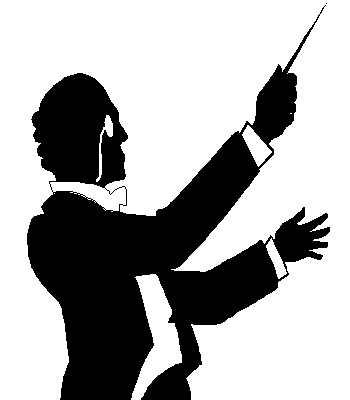Rising STARS
Introduction l Task l Process l Resources l Evaluation l Conclusion
 |
"This
is the conductor of the Chicago Symphony Orchestra.
We have had a terrible accident here! During last evening's performance of Sousa's The Thunderer march, our lead player was startled by the enthusiastic booming of the bass drum. He tipped over in his chair, fell off the risers and lodged himself headfirst into a tuba bell. Needless to say, he will not be able to play for this evening's performance and we need you to substitute for him. Can you play the gig tonight?" |
This is
your big break! Up until now you have been limited to playing wedding
and bar mitzvahs gigs. Now you have the chance to play in the world
famous Chicago Symphony!
But there will be no practices...
no rehearsals...
The first time you sit in front of the music, the audience will be in their seats!
Are you
ready? Can you sightread music? Can you sightread well enough
to perform in a public performance the first time you've seen the music?
If you are confident in the fundamentals of music reading, you will be
a STAR!
Introduction l Task l Process l Resources l Evaluation l Conclusion
By the end of this webquest...
| 1. Reaction
Journal Entry: Take a moment to reflect on what
your initial reaction to this situation would be and write a journal entry. You may use your own paper or you may double click on this link, print out and use these Music Journal Entry Pages. 2. Gather information from Resources to enable you to sightread better. 3. Complete the STARS WORKSHEET. 4. Reflection Journal Entry: Reflect on how confident you feel about sightreading new music now and write your second journal entry. 5. View the music to The Thunderer, print it out and sightread it in your home practice time. Use the STARS method to become familiar with the music before you play! 6. Evaluation Journal Entry: After you have sightread The Thunderer, write a journal entry evaluating how you feel you did sightreading the music. |
Introduction l Task l Process l Resources l Evaluation l Conclusion
What does STARS
mean?
Investigate "S" further.
Note reading on the Treble Clef http://www.jazclass.aust.com/bt1.htm#05
Note reading on the Bass Clef http://www.jazclass.aust.com/bt1.htm#06
Understanding Key Signatures http://www.jazclass.aust.com/bt2.htm#03
Sharps, Flats & Accidentals http://www.jazclass.aust.com/bt2.htm#02
Investigate "T" further.
Reading Time Signatures http://DataDragon.com/education/reading/timesig.shtml
Decifer Italian tempo terms and more http://www.musictheory.halifax.ns.ca/definitions.html
Pronunciation of Tempo Terms http://italian.about.com/homework/italian/library/weekly/aa092700b.htm
Investigate "A" further.
Basic Articulation Chart
Teenage Music Articulation Turtles
Special Low Brass Article http://www.uni.edu/funderbu/articles/articulation.html
Investigate
"R" further.
Basic Rhythm Counting
http://www.gspyo.com/education/html/count.html
Practice Your Rhythm Reading http://members.tripod.com/~bkezelos/tutorial.htm
Advanced Rhythm & Meter Glossary http://www.music.indiana.edu/som/courses/rhythm/glossary.html
Use your Rhythm Diagramming Packet found in your music folder.
Investigate
"S" further.
A Pictoral Guide to Music Symbols http://www.treblis.com/Notation/Music.htm
Musical Terms Glossary http://www.azstarnet.com/~solo/glossary.htm
Pronunciation Guide to Musical Terms http://members.tripod.com/~pronounciation/
Why do I need to know how to sightread?
Brief Reasoning
http://www.emich.edu/public/music/wp/sightreading.html
In-depth Reasoning
http://pionet.net/~hub7/sight.html
Introduction l Task l Process l Resources l Evaluation l Conclusion
Turn in your written work to your director!
1. Reflection Journal Rubric
2. STARS Worksheet Rubric
Introduction l Task l Process l Resources l Evaluation l Conclusion